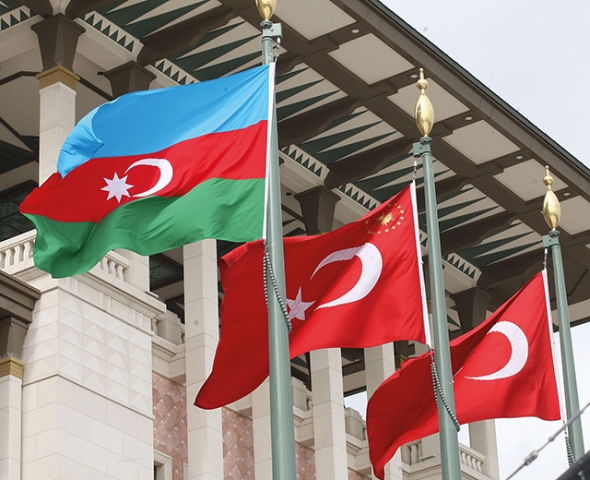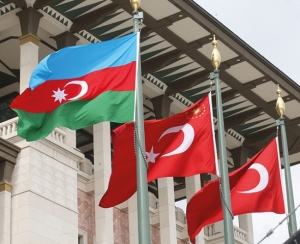Perception of Turkey in Georgia - Enemy or Ally?
Op-Ed
Imagine Georgia being the largest trading partner for one of its neighboring countries with a turnover of $1.8 billion. Unlike other neighbors, only Georgia has established borders with this country, and with our Foreign Minister calling on the international community to bring this country into NATO, Georgia trains and arms the representatives of the armed forces of this country within the framework of partnership and various agreements, supports the territorial integrity and sovereignty of this country in international organizations, and in spite of all that, in this country, specific forces come into politics through anti-Georgian campaigns and become stronger, which in turn strengthens the interests of Georgia's rival state.
It is not wrong if we say that Turkey is in a similar situation in Georgia, and Ankara is openly worried about this. It is not difficult to read these messages from the recent media activities of the Turkish Ambassador to Georgia, Fatma Seren Yazgan. However, both the experts in realpolitik and pragmatism and a large part of the audience will rightly ask: What is eating Turkey in Georgia? Posing questions about Turkey in this form is the easiest thing to do in Georgia.
The education system established after the occupation and Sovietization of our country in 1921 purposefully created the image of Turkey as a historical enemy, thus saving the face of the modern and sole occupier, the Soviet Union. This purposeful and manipulative propaganda left a painful mark on three generations of Georgians. According to my subjective observations, the Russian aggression in August 2008 is much harder to build in the collective memory of Georgians, while specific stories, narratives and icons of the battles between Ottomans and Georgians many centuries ago are constantly being reproduced and formed in our modern society.
This has something to do with realpolitik and pragmatism. That is, a large part of the Georgian population does not believe in "Turkish altruism" in relation to Georgia. A controversial question that has arisen in relation to Turkey, What is eating Turkey in Georgia?, which has deep, psycho-historical and emotional roots, is logically followed by another factor. Most Georgians know that modern international relations are, in fact, based on "reciprocity" and mutually beneficial deals. In this relationship, neither partnership, nor alliance, nor friendship is one-sided. The parties are constantly looking out for the best from each other. For example, let’s not deceive ourselves and say that the Georgian humanitarian act of providing healthcare to people living in separatist Abkhazia has a political overtone. Bringing "Deda Ena" books to Saingilo may go beyond a cultural and educational event. That is, the authors of the question, What is eating Turkey in Georgia?, wonder at what price a historical enemy-state can become our friend. Thus, there are sufficient grounds to pose the above question in Georgia. And if the Russian propaganda machine pushes it a little, this question might be posed as loudly as possible.
Let us try to answer this question together, what interest Turkey may have in Georgia and how real are the fears in the collective memory of Georgians associated with the destruction of our territorial integrity and the religious persecution of Georgians.
Turkey's pragmatic interest is diversifying energy resources.
The share of the Russian gas in the total consumption of the natural gas in Turkey amounts to 33-40%. This figure stood at 52% in 2017. Turkey already uses the pipelines running through the territory of Georgia. For example, the gas pipeline project TANAP, to which the last component TAP should be added soon. This means additional billions of cubic meters of Azerbaijani gas, which should further reduce the share of the Russian gas in Turkey's total natural gas consumption. On October 21, the adviser to the Turkish president made it clear to German media outlet Deutsche Welle that, “Russia is neither our enemy nor our ally, but we will not be able to build relations if we are too dependent on it, especially when it comes to energy.”
Turkey's interest is to strengthen its position as a leader in the region through energy projects in Georgia.
Turkey is trying to become a power to be reckoned with in Europe's energy supply. The launch of the TAP project will bring Turkey even closer to this strategic goal. From this Turkish perspective, the need for friendly relations with Georgia, which has the function of a transit corridor, is quite clear. There is no communication line of a similar strategic level with Azerbaijan.
Turkey has always been and will be Russia's natural competitor in the Caucasus, including in Georgia.
However, this competition has been based on a certain concept for many years. The depth of the competition between Moscow and Ankara, as well as the extent of their rapprochement, is determined by the activity of a "foreign", i.e. third force in the region. For example, neither Ankara nor Moscow is ready for the US and NATO to be strengthened in the Black Sea, but this does not mean that Russia's strengthening in the region makes Ankara very happy. In August 2008, Moscow politely toppled the peace and stability pact drafted by Ankara. Only the Turks speak about its existence today. Ankara failed to oppose the annexation of Crimea, and in all likelihood, despite its great desire, it will fail to be represented in Karabakh as it wishes. In this context of regional conflict, it is understandable that Turkey is using its soft power in Georgia to compensate for similar "failures" experienced with Moscow.
Most likely, what Ankara does not want is a common border with Russia.
Turkey is well aware that Moscow responds to the problems at the southern borders with only one traditional and ugly way: by moving the borders further south. Thus, friendly Georgia, free from anti-Turkish sentiments, dependent on Turkey's direct investment and trade turnover, which will also act as a buffer between Turkey and Russia, should be a wonderful prospect for Ankara until an even better option appears on the horizon.
Turkey tries to increase the spheres of influence in different geographical areas of Georgia with "soft power" and various manipulations.
It also needs it to reduce the degree of Russia’s strengthening in Georgia and the South Caucasus in general. In such a situation, it is interesting whether Ankara has a specific interest in the border region of Adjara, for example. It would be naive to think that it does not have. Moreover, the conversations about the "specific projects" implemented in Adjara should not be a story made of cardboard. However, what "specific / closed projects" are needed, when 70% of absolutely open and direct investments in Adjara are Turkish ones, resulting in up to 20,000 jobs?
To summarize, we mentioned five possible "Turkish interests" in Georgia that we have tried to explain. In my opinion, none of these "interests" can be considered in the short or medium term as an existential risk or threat to Georgia, and the very fact that neighboring countries may have certain intentions towards each other, I think, is quite normal. Georgia may have similar interests toward the historical Hereti region and / or the Turkish territories where the Laz people live today, and many others.
The main thing is that despite the fact that Turkey has deteriorated its relations with the West in recent years, it still remains a faithful and active follower of the rules of the game, the norms set by the West. That is, Ankara imposes self-limitations on itself due to its membership in this Western international relations and security system. Given its economic, financial, technological and military dependence on the West, it is unable, for example, to completely reject US support. And as long as both Georgia and Turkey play by the rules of the game imposed by the civilized world, the danger is minimal. The so-called "Turkish threat", as it is popularly called, will be devastating for Georgia in only a few cases:
1. If Erdogan follows the footsteps of Putin and / or any other even worse leader and completely disregards all the rules and norms already established by international law and interstate relations, and pursues foreign policy goals and interests only through military means, the likelihood of which is low in the near term;
2. If the Georgian government is not up to the economic, military or political challenges it faces;
3. If Georgia follows the path of Putin's Russia and / or Lukashenko and refuses to build a democratic, European, united and strong Georgia.
The repressive measures taken in Turkey in recent years under the pretext of anti-state measures do not really meet Western standards of fairness and transparency. This circumstance is notable for us. In addition, we should not overlook the Turkish contribution to the victory of Azerbaijan in Karabakh, which will surely find its "place" in the hearts and minds of ethnic Azerbaijanis living in Georgia. It is also noteworthy that since Ataturk, the Turkish government has been trying to achieve the so-called unity of Turkish-speaking countries, creating a "Great Turan". All of the above does not explicitly give us a basis for calm, nor there is reason to encourage a superficial policy based on pseudo-nationalism. Under the Russian occupation, extending peaceful, neighborly relations with Turkey would really be the best solution, along with the creation of all effective defense mechanisms.
By Giorgi Molodini, Head of the Strategic Communication Center - Georgia
Photo by Ali Ekeyılmaz / Sabah












